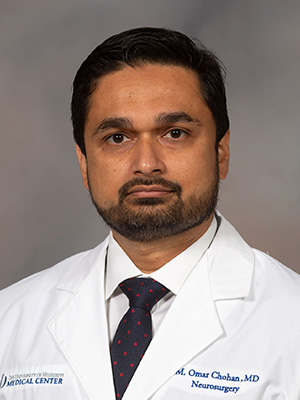Investigator highlight: Dr. M. Omar Chohan

Dr. M. Omar Chohan is an associate professor of neurosurgery and a neurosurgeon on the CCRI Interdisciplinary Brain/Central Nervous System care team. He has worked at UMMC for a year and a half. Chohan This physician/researcher focuses on better ways to provide treatment with the least side effects possible. He outlines his research and how he hopes it will help those with brain tumors. Recently, as the nation observed National Glioblastoma Awareness, he and others continued working to improve outcomes for those with these brain tumors.
What type of research do you do?
My research focus is in various pre- and intra-operative mapping techniques including functional mapping, florescence and image guidance and how these can be utilized for better functional outcomes. I was the institutional principal investigator in a multi-centered clinical trial studying the use of florescence-guided surgery for high-grade gliomas. My team was part of the multicenter effort that led to FDA approval of 5-ALA in glioma surgery in the United States.
Would you describe your most recent research and/or publications?
On the clinical side, I am interested in understanding the effects of tumors and subsequent surgical resection on higher cognitive outcomes in patients, especially in patients undergoing awake surgical procedures. On the basic science side, I am studying intratumor heterogeneity in glioblastoma that requires sampling of spatially distinct areas within the tumor by employing intra-operative 5ALA guidance. This is a multi-institutional project. In addition, I am collaborating with the lab of Dr. Pier Paulo Claudio, a CCRI researcher, to understand the role of immune-check point inhibitors in metastatic carcinomas to the brain.
How does your recent research and/or publications relate to your overall research within cancer?
Understanding how surgical resection impacts broader brain connectivity and functional outcomes is a major area of interest. It has the potential to revolutionize the way neurosurgeons approach tumor resection. As patients are living longer lives, it is incumbent on neurosurgeons to ensure that surgical resection respects major cognitive hubs surrounding tumors.
What inspired your most recent research and/or publications?
My patients are my inspiration. Primary brain tumors can be difficult to treat and there is no cure. Given access to precious tissue, a surgeon is in a unique position to help advance science by closely collaborating with translational researchers.
What advice can you give medical students and/or high-school students who are interesting in pursuing a career in research?
Identify a mentor early on. Get a solid foundation in basic research methodology including statistics. Present in journal clubs and publish.


